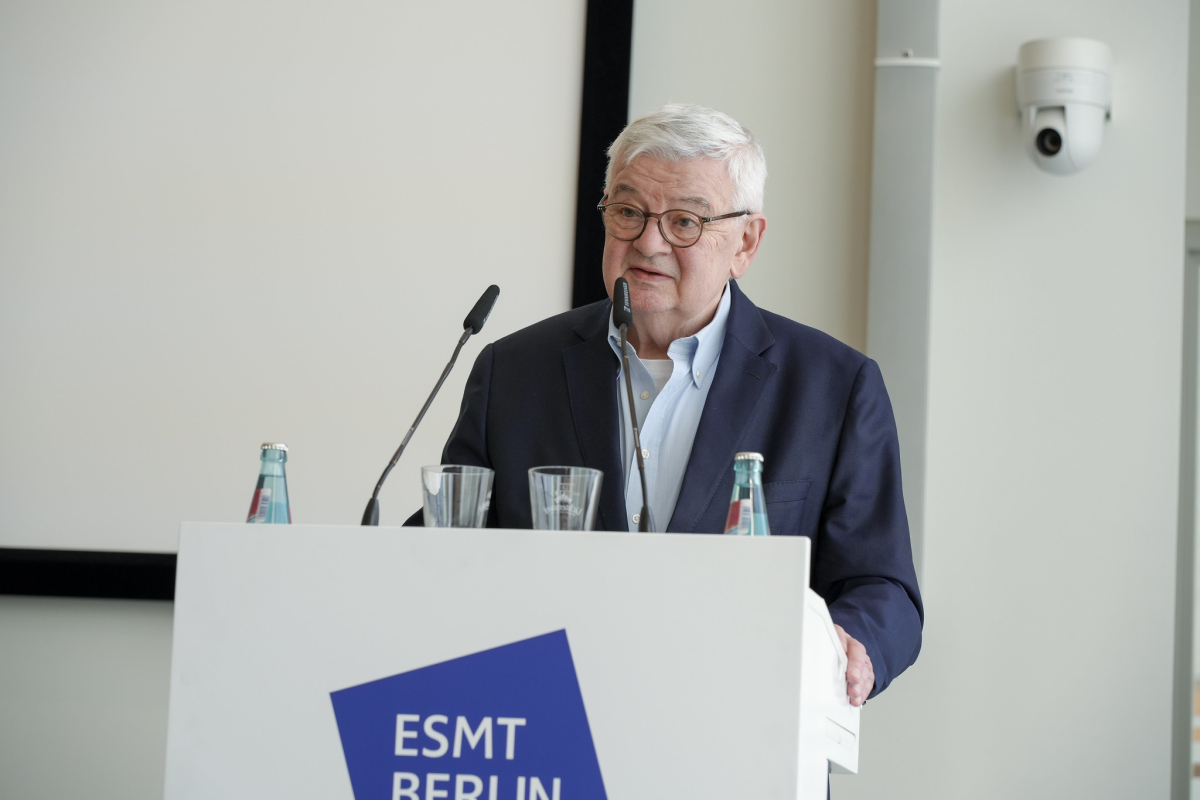Strategic wake-up: What Europe must do as transatlantic ties fray

The view from the Tower View Room at ESMT Berlin is a striking one – overlooking a city once divided and now emblematic of European unity. But on June 2, the mood among the nearly 200 leaders from business, politics, and academia gathered inside was one of sober recognition: the transatlantic alliance that once seemed immutable is under growing strain. The return of President Donald Trump to the White House has reignited questions about America’s reliability, and the event's central theme – “Trump’s Impact: The State and Future of Transatlantic Relations” – confronted that uncertainty directly.
Throughout the evening, a narrative emerged: Europe must confront its vulnerability and move from reliance to resilience. Informed by insights from former foreign ministers, trade negotiators, defense leaders, and economic experts, the message was clear – Europe must act, and fast.
Rethinking the transatlantic bond
In opening remarks, ESMT Berlin President Jörg Rocholl recalled his visit to East Berlin in 1989, just months before the Wall fell. That experience, he noted, underscores how deeply Europe’s trajectory has been shaped by transatlantic cooperation, particularly American support for German unification. But with global power structures shifting and new political leadership in Washington, the partnership now demands fresh thinking.
Harald Christ, founder of Christ&Company and ESMT’s first honorary senator, emphasized the need for a bold, contemporary dialogue. Rather than relying on past alliances, he urged European leaders to focus on present-day realities and future strategies.
A keynote warning: Europe must become a power
Joschka Fischer, former German Vice Chancellor and Foreign Minister, delivered a sobering keynote. Declaring that “the trust between free nations is gone,” he warned of permanent erosion in the transatlantic alliance. The global order, Fischer argued, is no longer centered on the US, but evolving into a “rivalry of great powers.”
Fischer criticized Europe’s failure to act following early warnings – such as Angela Merkel’s 2017 call for European self-reliance. He advocated for a stronger, united Europe capable of defending itself, especially as US foreign policy becomes more unpredictable. “Europe must become a power,” he said, “without betraying our values.”
Tariffs, trade, and transatlantic friction
In the first panel, moderated by Till Hoppe of Table.Briefings, panelists explored how shifting trade priorities in Washington are reverberating across the Atlantic.
Speakers noted that tariffs introduced during Trump’s first term – on steel, aluminum, and potentially soon on pharmaceuticals and semiconductors – are not temporary tools but long-term policy levers. While these moves are framed in the US as part of a reindustrialization effort and a broader China strategy, European exporters see them as unilateral and destabilizing.
Some participants suggested that Europe should consider a tactical industrial tariff agreement – focused on zero-for-zero tariffs for select sectors – as a short-term buffer. Others cautioned against escalating tensions too directly and urged a “smooth direction” to preserve negotiating space. One speaker described the goal as buying time to address broader challenges such as export diversification, energy dependence, and security coordination.
Digital sovereignty and Europe’s industrial future
Beyond tariffs, the panel examined the rising importance of digital sovereignty. Europe’s position – where personal data is considered a public good rather than a commercial asset or state property – was highlighted as both a strength and a vulnerability. Panelists described the current digital landscape as a “new age of colonization,” where control over data infrastructure is emerging as a decisive factor in Europe’s economic and political autonomy.
Speakers stressed that Europe must accelerate its development of secure digital infrastructure and avoid overdependence on US or Chinese platforms. Specific actions discussed included expanding funding for cloud and AI initiatives, establishing common standards for data privacy and portability, and reducing fragmentation across the EU’s digital markets.
The conversation also touched on fiscal risk, with America’s $36 trillion debt flagged as a potential catalyst for strengthening Europe’s capital markets. Some argued this moment presents a window for promoting the euro and developing deeper financial instruments in the EU.
Strategic autonomy and security imperatives
The second panel, moderated by Alexander Reinhardt of Christ&Company, turned to defense and strategic autonomy.
Opening the discussion, Michael Schoellhorn, CEO of Airbus Defence and Space, warned that Europe can no longer rely on unconditional US security guarantees. He identified three interlocking uncertainties: America’s long-term commitment to NATO, Russia’s intentions, and Europe’s fragmented defense posture.
Participants emphasized the need for greater scale, readiness, and interoperability across European forces. Investing in domestic defense industries was framed as essential – not only to reduce dependency on US suppliers, but to strengthen Europe’s ability to respond to crises on its own terms.
While most agreed on the need for greater European autonomy, some expressed caution about how this should be framed. Strategic autonomy, it was argued, should not become a political wedge, but a pragmatic strategy encompassing not just defense, but also digital, energy, and economic dimensions essential to European resilience. Several speakers highlighted the importance of maintaining existing defense-industrial cooperation with US firms and advised against binary thinking. Instead, strategic autonomy was described as an “insurance policy” – one that complements transatlantic defense while preparing for less predictable futures.
Generational readiness and societal buy-in
A moment of reflection came during the Q&A, when a student asked about polls showing low willingness among young Germans to defend their country in a crisis.
Panelists acknowledged that Europe’s readiness is not only a matter of military hardware or policy, but also of mindset. For a school like ESMT, which brings together students from around the world to develop responsible leaders for business and society in Europe and beyond, this question carries institutional relevance.
Building a culture of responsibility and resilience, the speakers argued, must start in education, civic engagement, and open dialogue – one that reshapes public understanding and support for Europe’s evolving security and leadership role. Military preparedness, like economic and digital strategy, relies on the belief that Europe is worth defending.
What Europe must do now
As discussions throughout the evening underscored, Europe’s response must be bold, coordinated, and sustained – and it must begin within months, not years, if it is to meaningfully shape the next phase of US–EU relations before further realignment sets in.
Key actions include:
- Negotiate targeted industrial tariff agreements to reduce friction while building long-term trade resilience.
- Invest in digital sovereignty through cross-border tech initiatives, interoperable standards, and secure infrastructure.
- Strengthen defense capabilities via procurement reform, support for European industry, and improved interoperability.
- Promote civic and generational readiness by embedding European values and responsibility in public discourse and education.
From analysis to action
By night’s end, the message was clear: In an age of fragmentation and rivalry, Europe must chart its own course – secure, united, and values-driven. Yet beneath the strong consensus, the event also surfaced tensions: between urgency and caution, independence and interdependence, and strategy and sentiment. As panelists pointed out, the debate is not about whether Europe should act, but how. As President Rocholl emphasized, the transatlantic partnership is not a fragile arrangement, but one that evolves under pressure – provided it is guided by clarity, responsibility, and resolve.
The next chapter of transatlantic relations will not be written in Washington alone. It begins here, in rooms like this one.
Speakers: Harald Christ, Founder of Christ&Company and ESMT honorary senator; Dr. Laura von Daniels, Head of Research Unit “The Americas” at Stiftung Wissenschaft und Politik; Joschka Fischer, former German Vice Chancellor and Foreign Minister, founder and namesake of Joschka Fischer & Company; Jörg Frischholz, CEO of NordLB; Thomas Gottschild, Managing Director of MBDA Deutschland; Till Hoppe, Journalist, Table.Briefings; Dr. Claudia Major, Senior Vice President for Transatlantic Security at the German Marshall Fund; Justin McCarthy, Partner, Government Relations at DGA/Albright Stonebridge Group; Dr. Marcus Müller, Management Board Member at OHB SE; Philip T. Reeker, Ambassador, Partner at DGA/Albright Stonebridge Group and former US Assistant Secretary of State for Europe; Alexander Reinhardt, Partner, Christ&Company; Jörg Rocholl, President, ESMT Berlin; Michael Schoellhorn, CEO of Airbus Defence and Space; Rolf Schumann, Co-CEO of Schwarz Digits; George Weinberg, Chair of Republicans Overseas in Germany.
Cooperation partners: Christ&Company, Joschka Fischer & Company, DGA/Albright Stonebridge Group, Table.Briefings
Photos: Mark Bollhorst and Maren Strehlau
Location: ESMT Berlin on June 2, 2025
Interested in our events?
